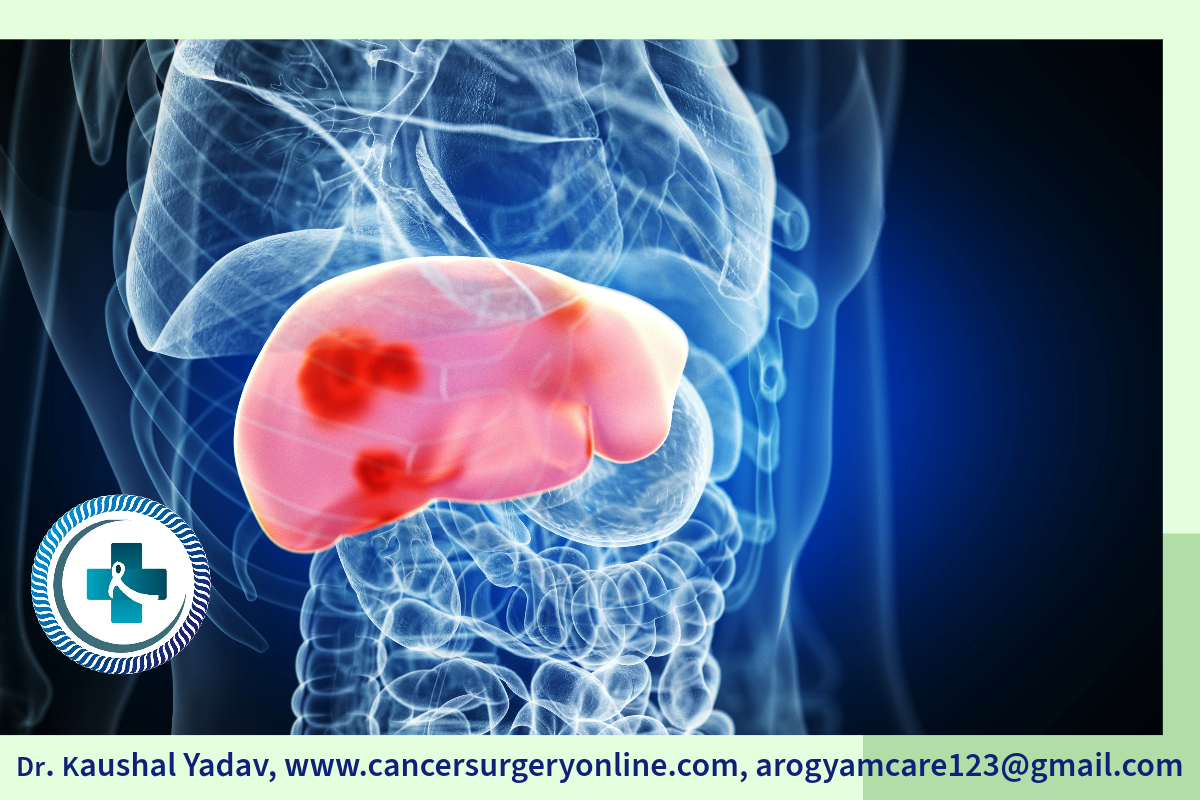Liver Cancer

Liver is one of the largest and essential organ of body. Food nutrients absorbed from intestine reaches liver via portal blood circulation where they are metabolized and essential building blocks are formed. Liver is an important organ for digestion, metabolism and synthesis of many chemicals required by body. Apart from primary cancers arising in liver, it is also one of the most common sites of metastasis from other cancers of body.
Types
- Hepatocellular Carcinoma: most common
- Cholangiocarcinoma
- Hepatoblastoma: rare, mainly in children
Risk Factors
Alcohol
Alfatoxin exposure: produced by mold/ fungi that grow on food grains, peanut, corn.
Obesity
Fatty Liver Disease
Chemical exposure like arsenic, viny chloride, hemochromatosis
Older age >50 years
Male are more predisposed than females
Screening for Liver Cancer:
There are no general screening guidelines for liver cancer. Those patients who are at risk because of cirrhosis are advised to remain in close followup and screening with ultrasound and S. Alfa-fetoptotein (AFP) every 6 months.
Alarmimg Signs/ Symptoms of Liver Cancer
Most of the time liver cancer is detected in late staged because it keeps on growing without any symptoms. There are certain symptoms which if present, consultation should be done with doctor and get checked to find the exact cause.
- Enlarged liver- swelling in ride side upper abdomen
- Swelling because of fluid in abdomen (Ascites)
- Abdominal pain
- Feeling full/ loss of appetite
- Nausea/ vomiting/itching
- Unexplained weight loss/ weakness/ fatigue
- Signs and symptoms of liver failure
Investigations
- Blood Investigations: Liver Functions tests, tumor markers like AFP, CA 19-9, PIVKA
- Triphasic CECT/ MRI: very accurate test for diagnosis, staging and treatment planning
- Bone scan/ PET CECT : for staging and assessment of disease spread.
- Ultrasound is many times initial investigation
- Biopsy is required sometimes when diagnosis is not clear
Treatment
Treatment of liver cancer as per best oncologists depends on
- Number/ size and location of the tumor within the liver
- Functional reserves of liver
- Underlying liver parenchyma normal or cirrhosis
- Involvement of other organs
Surgery: Treatment is planned considering all these parameters. Surgery is the only curative treatment in localized liver disease. Resection and transplant are two curative options, and these are advised and planned by considering function of liver and underlying cirrhosis grade.
Hepatectomy: removes a portion usually right or left half of liver. The remaining healthy liver regrows. Sometimes extended liver resections are also done to completely clear the disease where only 25% of liver is left. Proper assessment of underlying liver parenchyma reserve is very important. Sometimes PTBD to decrease jaundice is required before major surgery. Sometimes tumor side portal vein embolization is done to increase function capacity of remaining liver.
Liver transplant: replaces the entire diseased liver with a healthy liver from a suitable donor. Multiple cancers and patients with underlying cirrhosis of grade B and C are suitable candidates for this surgery.
To Book Appointment for Cancer Surgery :
Integration of Multimodality Treatment
- Ablation : Heat (Radiofrequency ablation) or ethanol injections are used to destroy the cancer cells. They useful in small tumors in patients who are not fit for surgery.
- Targeted therapy : medications are designed to hit/ target cancer cells with specific receptors. It decreases the tumor growth. Targeted therapy can be helpful for people where disease has spread beyond liver to other organs.
- Embolization and chemoembolization : Embolization and chemoembolization block off the hepatic artery supply to tumor. Small particles are used for this to reduces blood flow to the tumor. In chemoembolization, chemotherapy drugs are embolized into the hepatic artery. This procedure is used in patients where there are multiple tumors in both lobes of liver and disease has not spread beyond liver.
- Immunotherapy is also helpful to some extent in metastatic patients.
Related Video
Got some questions
- If all relavant examination and investigations has been done than plan of treatment is finalized with colon cancer surgeon
- After deciding surgical procedure cost estimate can be taken from billing department or hospital. Clinic or hospital department coordinator will assist in case any help required. +918750587489,
- you can visit nearby hospital for colonoscopy screening as advised in our screening section or you can read various society guidelines like American cancer society, USPTF.
- You can consult us through our online consultation link. https://api.whatsapp.com/send/?phone=918750587489&text=I+am+Looking+for+an+appointment+with+Dr.+Kaushal+Yadav.+Please+Help&type=phone_number&app_absent=0

